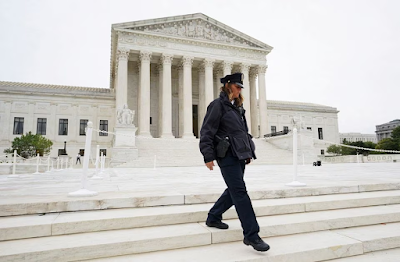On June 22, 2023, the
California Supreme Court held Government Code § 821.6 does not provide broad
immunity to police officers for allegedly negligent actions in the course of a
law enforcement investigation. [Leon v. County of Riverside, 2023 WL 4112144]
In Leon, the spouse of a man shot and
killed in his driveway sued the responding peace officers for negligent
infliction of emotional distress for allegedly leaving his naked body exposed
to the public for eight hours. The Court
confirmed that while other provisions of the Government Claims Act may confer
immunity for certain investigatory actions, , section 821.6 of the Government
Claims Act does not broadly immunize police officers or other public employees
for any and all harmful actions they may take in the course of investigating
crime.
José Leon was shot and killed in a driveway near his home. Upon arrival
at the scene, Riverside County Sherriff’s deputies heard additional shots. They
moved Mr. Leon’s body behind a vehicle so that they could attempt to revive him
but were unsuccessful. The movement caused Mr. Leon’s pants to drop to his
ankles and expose his naked body. Mr. Leon’s body remained uncovered for
approximately eight hours while officers searched for the shooter and
investigated the shooting. The officers ultimately determined that the shooter
had killed himself shortly after killing José. José’s wife, Dora Leon, sued the
County of Riverside for negligent infliction of emotional distress.
During summary judgment proceedings, the County of Riverside
argued that its employees were immune under section 821.6 for “all conduct
related to the investigation and filing of charges.” Because the suit arose
from steps taken while investigating a homicide, the County argued, both the
employees and their employer were immune from liability. More specifically, the
County’s position was that injuries caused by police investigations qualify
because of the close relationship between investigations and prosecutions. The
trial court agreed and entered judgment for the County. The Court of Appeal
affirmed that relying on a line of appellate cases that previously
“consistently construed section 821.6 as immunizing a public employee from
liability for any injury-causing act or omission in the course of the
institution and prosecution of any judicial or administrative proceeding,
including an investigation that may precede the institution of any such
proceeding.”
Supreme Court
Disagrees with Previous Court of Appeal Decisions Regarding Claims Act Immunity
Under Section 821.6 of the Government Claims Act:
The Supreme Court granted review and held that section 821.6 of the
Government Claims Act protects public employees from liability only for
initiating or prosecuting official proceedings, thereby disapproving the prior
line of appellate cases. Due to the fact the provision of the Government Claims
Act relied on by the County did not apply, the County was not immune from the
claim for negligent infliction of emotional distress claim. The Court reasoned
that while many Courts of Appeal extended section 821.6 immunity to claims for
injuries caused by official conduct other than the initiation or prosecution of
a proceeding, including claims of harm stemming from police investigations,
that conclusion is inconsistent with section 821.6’s text and history, as well
as Supreme Court precedent. Specifically, the language of 821.6 does not cover
investigatory acts because an investigation does not constitute the initiation
or continued prosecution of official proceedings. The Court also found that the
Legislature recognized, and the courts should respect, the traditional
distinction between mere investigation and the prosecution of legal action. The
Court explained that the County’s argument that injuries caused by police investigations
qualify because of the close relationship between investigations and
prosecutions was at odds with the plain meaning of the statutory language. The
Court also highlighted the fact that investigations often do not lead to the
institution or prosecution of any proceedings, which is what happened in this
case.
Finally, the legislative history also contains no suggestion that
the statute was also designed to create broad immunity for police officers
engaged in investigation. Thus, when a claim of injury does not stem from the
initiation or prosecution of proceedings, section 821.6 immunity does not
apply. Due to the fact that section 821.6 prosecution immunity was the
only defense addressed by the trial court and Court of Appeal, the decision did
not address other immunity defenses raised by the County, and the case was
remanded for further proceedings consistent with the Court’s opinion.
This ruling has limited impact given the legislative changes under
Senate Bill 2, which became effective January 1, 2022. Under S.B. 2, the state immunity provisions
in sections 821.6, 844.6, and 845.6 of the Government Claims Act no longer
apply to any cause of action brought against any peace officer, custodial
officer, or directly against a public entity that employs them. However, the decision is important as it
demonstrates that the Supreme Court of California is inclined to take up issues
that will narrow the immunities and protections previously available to public
employees.


